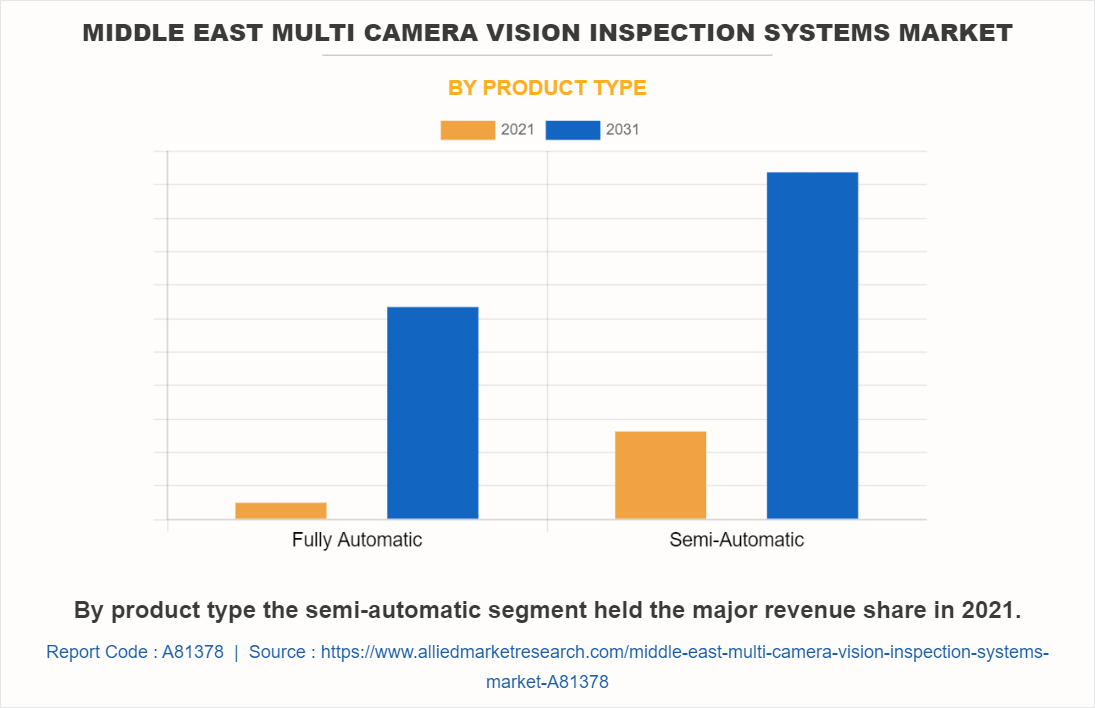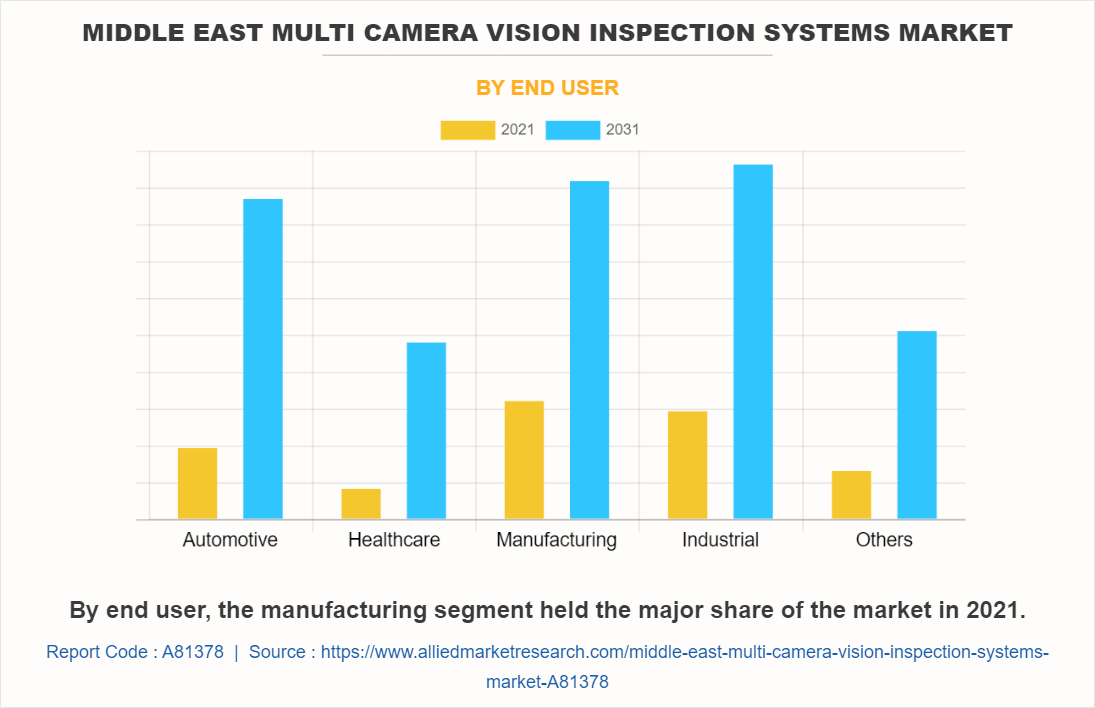The growth of the Middle East multi-camera vision inspection systems market is primarily driven by the increasing need for automation among industries. The demand for efficiency and accuracy in various industries has led to the rise of fully automatic and semi-automatic inspection systems. In addition, the expansion of the automotive sector acts as the key driving force of the Middle East multi-camera vision inspection systems market. This is attributed to the increasing need for high-precision inspection. These systems play a crucial role in ensuring the quality and safety of automotive components, thus driving their demand in this sector.

The development of the healthcare sector notably contributes toward the growth of the market. This is attributed to the fact that precision in medical devices and equipment has led to the incorporation of multi-camera vision inspection systems. They offer a level of quality control that is indispensable in this field, thereby fueling market growth. Moreover, the rise in demand for streamlined processes and the elimination of human errors in the manufacturing and industrial sectors has boosted the demand for multi-camera vision inspection systems, as these systems have become integral in the quality assurance process across diverse industries.

However, one of the prominent restraints is the high initial investment required for setting up these systems. Many companies, especially small- & medium-sized enterprises, face financial constraints. Moreover, the dearth of skilled personnel to operate and maintain these systems poses a considerable challenge, which restrains the growth of the multi-camera vision inspection systems market. In addition, the regulatory environment in the Middle East is not always conducive to the adoption of cutting-edge technology. Stringent regulations and standards can impede the integration of these systems into certain industries, posing a significant market restraint. On the contrary, one of the most promising trends is the proliferation of these systems into new application areas. The market is poised to witness a surge in demand from industries such as food and beverage, electronics, and pharmaceuticals.

The emergence of advanced technology, including artificial intelligence and machine learning, is set to revolutionize the capabilities of multi-camera vision inspection systems. These systems will become smarter, more adaptable, and capable of handling a wider range of inspection tasks. On the regulatory front, there is hope that industry-specific standards will be developed, providing a more conducive environment for the integration of these systems into various sectors. Such standards could pave the way for broader market penetration.
The Middle East multi camera vision inspection systems market is segmented into product type and end user. On the basis of product type, the market is divided into fully automatic and semi-automatic. Fully automatic inspection systems are likely to dominate the landscape, owing to their superior accuracy and efficiency. However, semi-automatic systems will still find their niche, particularly in industries where flexibility is paramount. By end user, it is segregated into automotive, healthcare, manufacturing, industrial, and others.
The key players operating in the market are Cognex Corporation, Keyence Corporation, Teledyne Technologies Inc., Omron Corporation, Basler AG, National Instruments Corporation, Matrox Imaging, ISRA Vision AG, Sick AG, and Omron Microscan Systems, Inc. Market scenarios are expected to evolve as competition intensifies, with companies focusing on product differentiation and innovation to gain a competitive edge. The market's growth trajectory is poised to be dynamic, with periodic fluctuations driven by technological advancements and economic conditions.
Porter's five force analysis comes into play in this perplexing market landscape. The rivalry among existing competitors is intense, as companies vie for market share. The threat of new entrants is moderated by the high barriers to entry, including the need for substantial capital investment and technical expertise. The bargaining power of buyers varies across industries, with some sectors being more price-sensitive than others. The bargaining power of suppliers is influenced by the availability of components and technologies, which can impact production costs and, subsequently, pricing.
The threat of substitutes is another facet of this complex market. While multi-camera vision inspection systems have no direct substitutes in terms of precision and accuracy, alternative quality control methods can pose a challenge, particularly in cost-sensitive industries. A SWOT analysis sheds further light on the market's intricacies. The strengths of multi-camera vision inspection systems lie in their ability to deliver unparalleled precision and automation. They are indispensable in industries where quality control is paramount.
However, weaknesses are present, primarily in the form of the high initial investment and the need for skilled operators. Overcoming these weaknesses is crucial for sustained market growth. Opportunities abound in the form of expanding applications, technological advancements, and evolving regulations. These opportunities can be harnessed to drive market growth and diversification. Threats, on the other hand, are the financial barriers and the shortage of skilled personnel. Addressing these threats is essential to ensure the market's resilience and adaptability.
Key Benefits For Stakeholders
- Enable informed decision-making process and offer market analysis based on current market situation and estimated future trends.
- Analyze the key strategies adopted by major market players in Middle East multi camera vision inspection systems market.
- Assess and rank the top factors that are expected to affect the growth of Middle East multi camera vision inspection systems market.
- Top Player positioning provides a clear understanding of the present position of market players.
- Detailed analysis of the Middle East multi camera vision inspection systems market segmentation assists to determine the prevailing market opportunities.
- Identify key investment pockets for various offerings in the market.
Middle East Multi Camera Vision Inspection Systems Market Report Highlights
| Aspects | Details |
| Forecast period | 2021 - 2031 |
| Report Pages | 89 |
| By Product Type |
|
| By End User |
|
| Key Market Players | Cognex Corporation, Omron Microscan Systems, Inc., National Instruments Corporation, Omron Corporation, Keyence Corporation, Teledyne Technologies Inc., Matrox Imaging, ISRA Vision AG, Basler AG, Sick AG |
The Middle East Multi Camera Vision Inspection Systems Market is projected to grow at a CAGR of 13.7% from 2021 to 2031
Xsight Systems (Israel), Spectrum Imaging (Israel), Teledyne Optech (Canada), Coherent Vision (UAE), Sick AG (Switzerland), Miraspee Haar (Israel), Isra CTS (Israel), GN Hearing (Denmark), Invensas (USA), Opticon (Netherlands) are the leading players in Middle East Multi Camera Vision Inspection Systems Market
1. Enable informed decision-making process and offer market analysis based on current market situation and estimated future trends.
2. Analyze the key strategies adopted by major market players in middle east multi camera vision inspection systems market.
3. Assess and rank the top factors that are expected to affect the growth of middle east multi camera vision inspection systems market.
4. Top Player positioning provides a clear understanding of the present position of market players.
5. Detailed analysis of the middle east multi camera vision inspection systems market segmentation assists to determine the prevailing market opportunities.
6. Identify key investment pockets for various offerings in the market.
Middle East Multi Camera Vision Inspection Systems Market is classified as by product type, by end user
Loading Table Of Content...
Loading Research Methodology...



